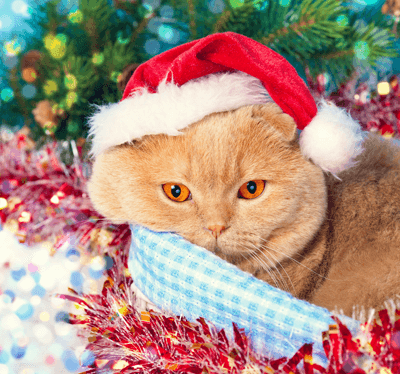Pet Hazards
These tips from the ASPCA Poison Control Center can help keep a trip to the emergency veterinary hospital OFF your holiday wish list:
Foods to Avoid:
- Alcoholic beverages
- Chocolate (baker's, semi-sweet, milk chocolate)
- Coffee (grounds, beans, chocolate covered espresso beans)
- Moldy or spoiled foods
- Onions, onion powder
- Fatty foods
- Salt
- Yeast dough
Toxic Plants
- Lilies that may be found in holiday flower arrangements could be deadly to your cat. Many types of lily, such as Tiger, Asian, Japanese Show, Easter, Stargazer, and the Casa Blanca, can cause kidney failure in cats.
- Poinsettias are generally over-rated in toxicity. If ingested, poinsettias can be irritating to the mouth and stomach, and may cause mild vomiting or nausea.
Christmas Hazards
- Christmas tree water may contain fertilizers, which, if ingested, can cause stomach upset. Stagnant tree water can be breeding grounds for bacteria, which can also lead to vomiting, nausea, and diarrhea, if ingested.

- Electric cords- Avoid animal exposure to electric cords. If they were chewed, they could electrocute your pet. Cover up or hide electric cords, never let your pet chew on them.
- Mistletoe has the potential to cause cardiovascular problems. However, mistletoe ingestion usually only causes gastrointestinal upset.
- Holly ingestion could cause vomiting, nausea, diarrhea, and lethargy.
- Ribbons or tinsel can get caught up in the intestines and cause intestinal obstruction.
- Batteries contain corrosives. If ingested they can cause ulceration to the mouth, tongue, and the rest of the gastrointestinal tract.
- Glass ornaments can cut the tissues of the gastrointestinal tract if ingested.
- Potpourris are popular household fragrances commonly used during the holiday season. Pets are often exposed to liquid potpourri by direct ingestion from simmer pots or spills, or by rubbing against leaky bottles or simmer pots containing the potpourri, or from spilling the containers upon themselves. Oral exposures result following grooming. Exposure of pets to some types of liquid potpourris can result in severe oral, dermal, and ocular damage. Dry potpourri generally doesn't cause those issues, but there may be problems due to foreign body and (possibly) toxic plant ingestion.
|